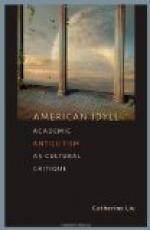“The pickers began coming to Wheatland on Tuesday, and by Sunday the irritation over the wage-scale, the absence of water in the fields, plus the persistent heat and the increasing indignity of the camp, had resulted in mass meetings, violent talk, and a general strike.
“The ranch owner, a nervous man, was harassed by the rush of work brought on by the too rapidly ripening hops, and indignant at the jeers and catcalls which greeted his appearance near the meetings of the pickers. Confused with a crisis outside his slender social philosophy, he acted true to his tradition, and perhaps his type, and called on a sheriff’s posse. What industrial relationship had existed was too insecure to stand such a procedure. It disappeared entirely, leaving in control the instincts and vagaries of a mob on the one hand, and great apprehension and inexperience on the other.
“As if a stage had been set, the posse arrived in automobiles at the instant when the officially ‘wanted’ strike-leader was addressing a mass meeting of excited men, women, and children. After a short and typical period of skirmishing and the minor and major events of arresting a person under such circumstances, a member of the posse standing outside fired a double-barreled shot-gun over the heads of the crowd, ’to sober them,’ as he explained it. Four men were killed—two of the posse and two strikers; the posse fled in their automobiles to the county seat, and all that night the roads out of Wheatland were filled with pickers leaving the camp. Eight months later, two hop-pickers, proved to be the leaders of the strike and its agitation, were convicted of murder in the first degree and sentenced to life imprisonment. Their appeal for a new trial was denied.”
In his report to the Governor, written in 1914, Carl characterized the case as follows:—
“The occurrence known as the Wheatland Hop-Fields riot took place on Sunday afternoon, August 3, 1913. Growing discontent among the hop-pickers over wages, neglected camp-sanitation and absence of water in the fields had resulted in spasmodic meetings of protest on Saturday and Sunday morning, and finally by Sunday noon in a more or less involuntary strike. At five o’clock on Sunday about one thousand pickers gathered about a dance pavilion to listen to speakers. Two automobiles carrying a sheriff’s posse drove up to this meeting, and officials armed with guns and revolvers attempted to disperse the crowd and to arrest, on a John Doe warrant, Richard Ford, the apparent leader of the strike. In the ensuing confusion shooting began and some twenty shots were fired. Two pickers, a deputy sheriff, and the district attorney of the county were killed. The posse fled and the camp remained unpoliced until the State Militia arrived at dawn next morning.
“The occurrence has grown from a casual, though bloody, event in California labor history into such a focus for discussion and analysis of the State’s great migratory labor-problem that the incident can well be said to begin, for the commonwealth, a new and momentous labor epoch.




